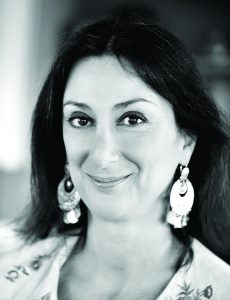Journalists have a “right to life”
Hello, readers. This is Sarah Dawood here, editor of Index on Censorship. Every week, we bring the most pertinent global free speech stories to your inbox.
I must confess that today’s newsletter is very bleak, so I won’t be offended if you click away in search of a more optimistic end to your week. We’re reflecting on how journalists are increasingly being silenced globally, not only with the threat of legal retribution or imprisonment, but with death – often with little or no repercussions for those responsible.
This week marked the seven-year anniversary of the murder of Maltese investigative journalist Daphne Caruana Galizia, who was killed in a car bomb attack on 16 October 2017. She reported extensively on corruption in Malta, as well as on international scandals such as the Panama Papers (the historic data leak exposing how the rich exploit secret offshore tax regimes).
Two hitmen were convicted for her murder in 2022, but criminal proceedings are still ongoing against three more suspects, including the alleged mastermind of the assassination and the alleged bomb suppliers. This week, free speech organisations signed an open letter to Malta’s prime minister calling on him to promptly implement robust, internationally-sound legal reform to keep journalists safe in future. The letter pointed to a public inquiry into her death, which found it was both “predictable and preventable”, and highlighted “the failure of the authorities to take measures to protect her”.
The start of this month marked another grim milestone – six years since the death of prominent Saudi journalist Jamal Ahmad Khashoggi. He was a regular contributor to major news outlets like Middle East Eye and The Washington Post, as well as editor-in-chief at the former Bahrain-based Al-Arab News Channel. A vocal critic of his government, he was assassinated at a Saudi consulate in Istanbul, Turkey.
Such attacks on free speech continue. We were appalled, for instance, to learn of the death of the 27-year-old Ukrainian journalist Victoria Roshchyna last week, a reporter from the front-line of the Russia-Ukraine war who had written for Index about her experiences. The circumstances around her death are still unknown, but we know she died in Russian detention.
Increasingly, governments or powerful individuals act with impunity – whereby their human rights violations are exempt from punishment – willfully ignoring international law that states journalists are civilians and have a “right to life”. For many victims, the course of justice is either delayed, as in Caruana Galizia’s case, or the circumstances around their deaths are obfuscated and murky, as in Roshchyna’s. Question marks remain over who is ultimately responsible, or how it happened, creating a cycle of censorship whereby it’s not only the journalists and their reporting that are silenced, but their deaths.
This impunity has been shown in plain sight throughout the Israel-Hamas war. To date, 123 Palestinian journalists have been killed in Gaza by Israeli forces, with the Committee to Protect Journalists concluding that at least five were intentionally targeted. The Israel Defense Forces (IDF) deny these claims, yet an Al Jazeera documentary recently revealed that journalists live in fear of their lives, and their families’. One of the most high-profile cases of a targeted attack was that of Hamza al-Dahdouh, the son of Al Jazeera Gaza bureau chief and veteran journalist Wael al-Dahdouh, whose wife and another two children were also previously killed in Israeli airstrikes. Two Israeli and three Lebanese journalists have also been killed in the conflict, with the International Criminal Court seeking arrest warrant applications for both Israeli and Hamas leaders for war crimes.
All these cases show a growing disregard for journalists’ lives, but also for the very essence of journalism itself. When not threatened with death or physical violence, media personnel are threatened with imprisonment, the closing of legitimate news offices, internet blackouts, and psychological and financial abuse. SLAPPs – strategic lawsuits against public participation – for instance, are being increasingly used globally by powerful and wealthy people as an abusive legal tool to threaten journalists into silence with eye-watering fines. How can “the fourth estate” truly hold power to account, when those in power can so easily dismantle and destroy their means of doing so?
At a time of devastating global conflict, the ability for journalists to report on stories free from the threat of harm, imprisonment, lawsuits or death has never been more important. To protect journalism itself, international and national law must work harder to protect the individuals most at risk. Without the threat of retribution for powerful individuals, the cycle of censorship will only continue.

